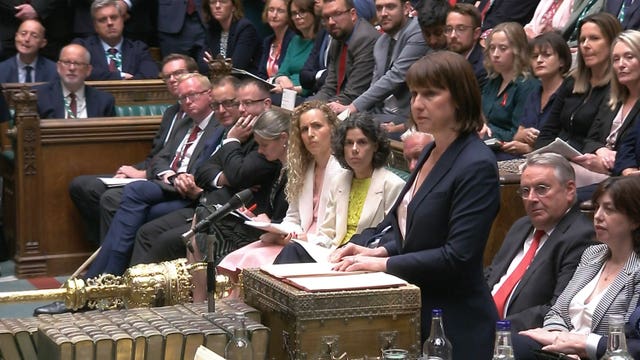The government said after taking office that it needed to plug a £22 billion “black hole” in the public finances.
Ms Reeves is said to have since identified a much larger funding shortfall of £40bn, which she will seek to plug to protect key departments from real cuts and put the economy on a firmer footing.
Here, the PA news agency looks at what we know and what we can expect from the budget.

– Private schools: From January, the government plans to scrap VAT exemptions and business relief for private schools to enable funding for 6,500 new public school teachers. The French and German ambassadors to the UK have called for international schools to be excluded from the plans.
– Education and childcare: Around £1.4bn has already been announced to rebuild failing schools, as well as trebling investment in free breakfast clubs, £1.8bn to expand government-funded childcare and £44m to support relatives and foster parents.
– Bus fares: The £2 fare cap will be replaced by a £3 cap by the end of 2025. Single coach fares in England are capped at £2 per journey (or £1.75 in London) on most routes from January 2023.
– Employment: £240m will be given to local services to get people back into work as the Government looks to cut the welfare bill.
– Social housing: Right to buy concessions for tenants of local authority-owned housing will be cut and an extra £500m of funding will go to the affordable homes programme.
The Government will launch a consultation on a five-year social housing rent agreement, seeking to cap what social housing providers can charge tenants in line with consumer price index inflation plus 1%.

– Housing construction: £128m has been confirmed for three projects: £56m to build 2,000 homes in Liverpool’s central docks, £25m to set up a new fund with Muse Places Limited and the Pension Insurance Corporation to deliver 3,000 energy efficient homes and £47m for local authorities to deal with river pollution which prevents house building.
– Free ports: Ms Reeves will not announce new free ports in the Budget, as originally announced by Downing Street, but will instead confirm funding for “next steps” on five new customs sites at three existing free ports.
– Debt rule: The chancellor has already confirmed he will change the way debt is measured to open the door for the government to spend billions more on infrastructure such as railways, roads, hospitals and new prisons. It is expected to move to Public Sector Net Financial Liabilities (PSNFL) as its new measure of debt, rather than the current benchmark of core public sector net debt.
– NHS: Billions of pounds are expected to be invested in health services, including £1.5bn for new surgery centers and scanners and £70m for radiotherapy machines. A further £1.8bn has been allocated for electoral appointments since July.
– State services: Ms Reeves is understood to have called on government departments to make efficiency savings of 2% to free up billions to be reinvested on the frontline.
– Taxes on employees: Labor said it would stick to its manifesto promise not to raise the main taxes on “working people”: National Insurance, income tax and VAT.

– National insurance contributions of the employer: The chancellor is expected to increase employers’ National Insurance contributions by at least one percentage point.
– Total income tax: It is also expected to extend the freeze on income tax thresholds, which forces people to pay higher rates through a process known as “fiscal drag”.
– Inheritance tax: Ms Reeves is reportedly considering changes to inheritance tax which could include extending the number of years someone must be alive after passing on wealth as a gift from seven to 10 years.
– Capital gains tax: Newspaper reports suggest that the capital gains tax paid on proceeds from the sale of an asset may rise. The changes may apply to shares or other taxable assets.
– Fuel fee: The tax, which is included in the price motorists pay for petrol at the pump, could also be raised for the first time in more than a decade. Motor fuel tax was frozen by the Tories between 2010 and 2022 and then cut by 5p to 52.95p per litre, where it remains.
– Vaping: The chancellor is reportedly considering increasing tax on e-cigarettes, echoing her Conservative predecessor Jeremy Hunt’s plans to discourage non-smokers from using vaping. Vaping products are subject to VAT of 20%, but unlike tobacco, they are not subject to excise duty.
